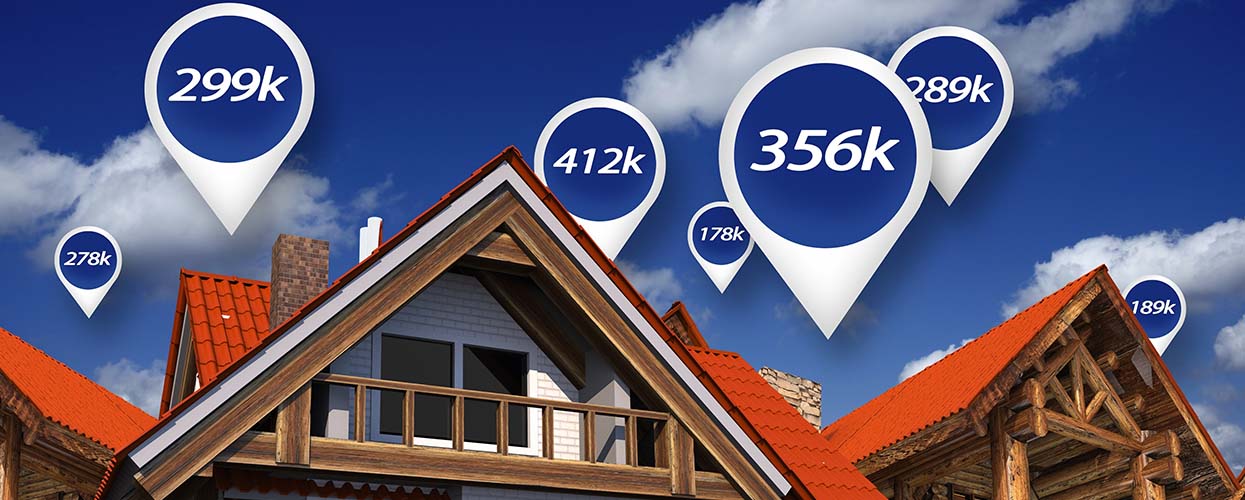Almost anyone can get a mortgage with a low down payment.
According to a recent survey, saving 20% down on a median-priced home could take an American earning the median U.S. salary 21 years. If that number astounds you, it might be time to abandon the conventional wisdom of putting 20% down. In reality, you no longer need a 20% down payment to purchase a home. There are several low-down-payment loans available for homebuyers at all levels. Only you can decide which one is best for you.
Mortgages with a low down payment
The majority of home buyers would qualify for a low-down-payment mortgage rather than a no-down-payment mortgage. Many homeowners can now purchase a home with only a 3 or 3.5% down payment thanks to today’s programs. Let’s begin with those.
FHA: low-down-payment mortgage for people with fair or bad credit.
A 3.5% down payment is needed for FHA loans. These loans, which the Federal Housing Administration (FHA) insured, are among the most flexible and forgiving available to today’s homebuyers. FHA loans are ideally suited for borrowers with a low down payment and average or below-average credit scores. They’re also useful for buyers looking for multi-unit homes as a primary residence (e.g., 2-unit homes, 3-unit homes, and 4-unit homes).
FHA loans are typically best-suited for low-down payment buyers with average or below-average credit scores.
What’s the drawback? Mortgage insurance premiums are required for FHA loans (MIP). However, those FHA MIP costs were decreased in January 2017 to help keep FHA loans affordable for buyers who use the service. It’s also worth remembering that FHA loans can be assumed. This means that a potential buyer of your home will be able to purchase it with the FHA loan — and the mortgage rate! — attached. The combination of today’s ultra-low mortgage rates and these lenient rules will make buying and selling a home with an FHA loan even more accessible.
For those with a lower salary, Home Ready/HomePossible is a good option
Fannie Mae offers the HomeReady mortgage, which has a low down payment. Freddie Mac’s equivalent is Home Possible. These services require only a 3% down payment, provide access to below-market mortgage rates, and provide subsidized private mortgage insurance rates. HomeReady also allows mortgage applicants to factor in the income of all household members when determining whether or not they qualify for a loan.
You may not have to be from a low-income family to be accepted. You must only own a home in a region that has been pre-approved.
This may include parents who receive a pension or social security benefits and children who earn a salary or other form of income. This feature is not available in Home Possible.
HomePossible, on the other hand, allows you to cover your entire down payment with gift or grant money. HomeReady, on the other hand, demands that you pay at least 3% out of pocket. The HomeReady service is only accessible in low-income communities, areas with a large minority population, and disaster-affected areas. To be accepted, you do not need to be in a low-income family or live in a predominantly minority neighborhood. You must only own a home in a region that has been pre-approved.
Conventional 97: A loan with a low down payment for people with decent to excellent credit.
The Federal Housing Finance Agency (FHFA), which is the parent of both Fannie Mae and Freddie Mac, recently revived the Conventional 97 scheme. The Conventional 97 program needs only a 3% down payment and, among other things, allows a buyer’s down payment to be gifted by a third party.
The only stipulation is that the gifter is related to the home buyer by blood or marriage or is a legal guardian, domestic partner, or fiancé. Every month, the Conventional 97 policy is often more expensive than a comparable FHA mortgage. However, the long-term costs are frequently lower. Regardless of your local mortgage loan cap, the Conventional 97 mortgage is limited to $548,250, and multi-unit homes are not permitted. Only fixed-rate mortgages are eligible for the initiative.
Every month, the Conventional 97 policy is often more expensive than a comparable FHA mortgage. However, since the program’s mortgage insurance can be canceled as soon as 12 months after purchase, the program’s long-term costs are frequently lower.
Good Neighbor: Government employees will get a mortgage with a low down payment
The Good Neighbor Next Door (GNND) program is a unique HUD mortgage program that allows homebuyers to put $100 down on the house. Members of law enforcement, firefighters, or emergency medical technicians, as well as pre-K through 12th-grade teachers, may participate in the program. In return for promising to make the house your sole residence for at least 36 months, buyers in the program earn a 50% — yes, 50%! — home buying discount.
The Good Neighbor Next Door initiative offers a 50% discount on home purchases, but the inventory is limited to FHA foreclosures.
A $100,000 home can be purchased for $50,000 by Good Neighbor Next Door. Buyers may use FHA, VA, or traditional mortgage financing through the Good Neighbor Next Door scheme, which helps to keep interest rates down. Note that the Good Neighbor Next Door policy gives you up to 180 days to move into your new home, so there’s no need to rush the housework if you want to make repairs before moving day.
Mortgages have no down payment
There are mortgage loans that don’t need any down payment at all, believe it or not. However, you must meet specific eligibility criteria to qualify for a zero-down home loan. USDA offers zero-down mortgages to rural homebuyers. The USDA loan is 100% funding and is guaranteed by the United States Department of Agriculture. The USDA loan is officially recognized as a “Section 502” loan, but lenders often refer to it as a “Rural Housing Loan,” a misnomer.
USDA loans are also available in non-rural areas, such as many U.S. suburbs. The USDA loan has one of the lowest mortgage rates of all the low- and no-down-payment mortgage programs and its mortgage insurance standards are also very low. USDA mortgage insurance premiums are half those of FHA loans, which is why many today’s borrowers would choose a USDA loan over an FHA loan, even though they intend to put down 3.5 percent.
The USDA loan is attractive because its mortgage rates are among the lowest of all low- and no-down-payment mortgage programs.
USDA loans are, simply put, less expensive. The USDA loan program is also one of the few low- to no-down-payment mortgage options available for manufactured and modular home purchases. To qualify for a USDA loan, a home buyer’s household income must not be more than 15% higher than the median income in the region. Large households, on the other hand, are given such exclusionary privileges.
You can look up this year’s USDA income limits here.
Veterans Affairs: no-money-down loans
VA loans are government-backed loans that the Department of Veterans Affairs backs. In general, active-duty military personnel honorably discharged service members, and several surviving spouses are eligible for VA loans. VA loans are special among low- and no-down-payment mortgage programs in that they do not require any downpayment and do not require regular mortgage insurance premiums. VA loans are assumable by potential VA home buyers and can be used for any kind of home — single-family, condo, multi-unit, and more.
In addition, a VA loan may be used to fund energy-efficient home improvements. A VA loan usually has the lowest interest rate of the three “major” loan forms — VA, FHA, and traditional. According to Ellie Mae’s data, VA mortgage rates are around one-eighth of a percentage point lower than FHA mortgage rates and can be as much as forty basis points (0.40%) lower than comparable traditional loans.
The piggyback loan (80-10-10 mortgage)
The “piggyback” mortgage is two mortgages, one of which is “piggybacked” on top of the other to borrow 90% of the purchase price of a home. The piggyback loan, also known as a “80/10/10 mortgage,” requires the lender to carry a 10% down payment to the closing table and, to avoid paying mortgage insurance, two mortgages are issued instead of one.
Taking a ride on someone else’s back, Homebuyers who intend to pay down or reduce the balance on their second mortgage within the first 24 months of homeownership also use mortgages. Usually, the first mortgage is a traditional loan for 80% of the home’s purchase price. The second mortgage is typically a ten percent home equity line of credit (HELOC). A Piggy-Back Mortgage’s second mortgage is often adjustable and linked to Prime Rate, related to the Fed Funds Rate.
When the economy is may, the Fed Funds Rate will suddenly rise, causing your monthly housing payment to skyrocket. When choosing a mortgage that is connected to the Prime Rate, be cautious. Homebuyers who intend to pay down or reduce the balance on their second mortgage within the first 24 months of homeownership also use piggyback mortgages.
Construction loans with a low down payment are available via the FHA 203k program.
Only the FHA 203k loan, out of all the low- and no-down-payment mortgage services offered to today’s home buyers, can be used for home construction. There are two types of 203k loans. The first is the Streamlined 203k, which is used for smaller projects and has a total repair cost cap of $35,000.
The “standard” 203k loan is the most popular, and it’s used for projects like moving walls or repairing plumbing or something else that prevents you from living in the house while the work is being done.
The basic 203k can also be used for landscaping or transforming a multi-unit property into a four-unit owner-occupied property.
Another advantage is that since the FHA guarantees the 203k loan, homebuyers who use it can refinance with the FHA’s successful Streamline Refinance program. The FHA Streamline Refinance is commonly regarded as the easiest and most efficient way to refinance an existing mortgage loan.
The Houston Premium Homes Difference
If you have any more concerns? Are you looking for some advice? Your Houston Premium Homes Realtor can be a valuable asset. Houston Premium Homes Agents are hyperlocal professionals who know everything there is to know about selling a property, including buying and we can recommend creditable mortgage loan officers.

